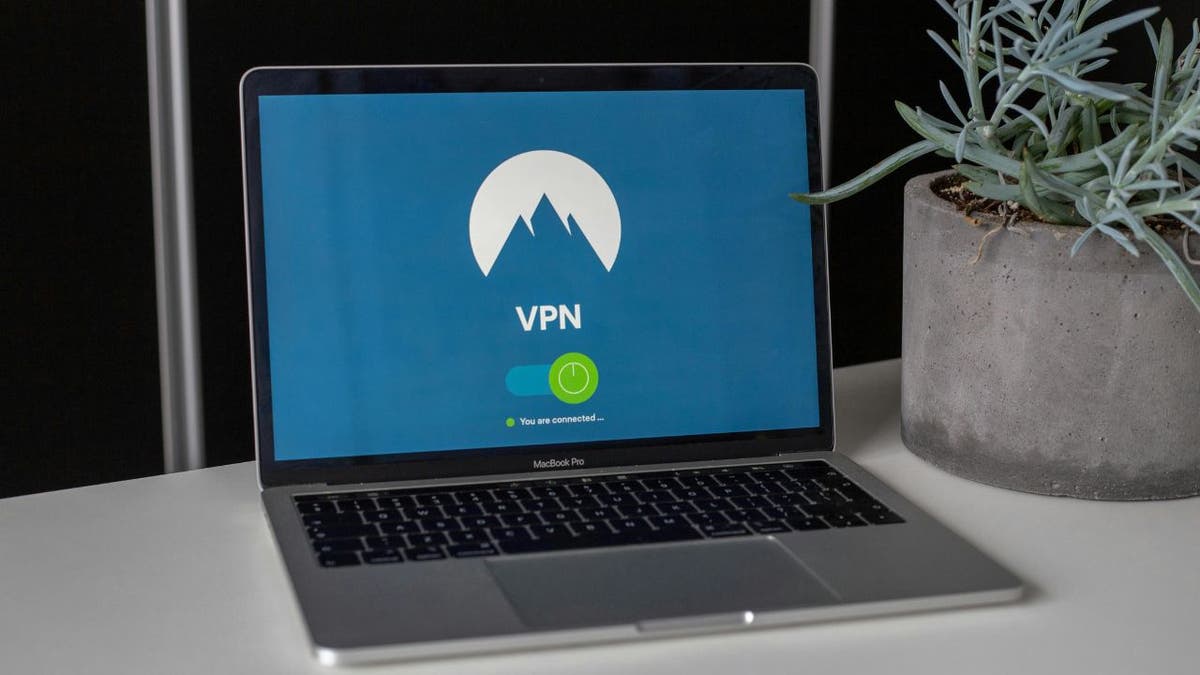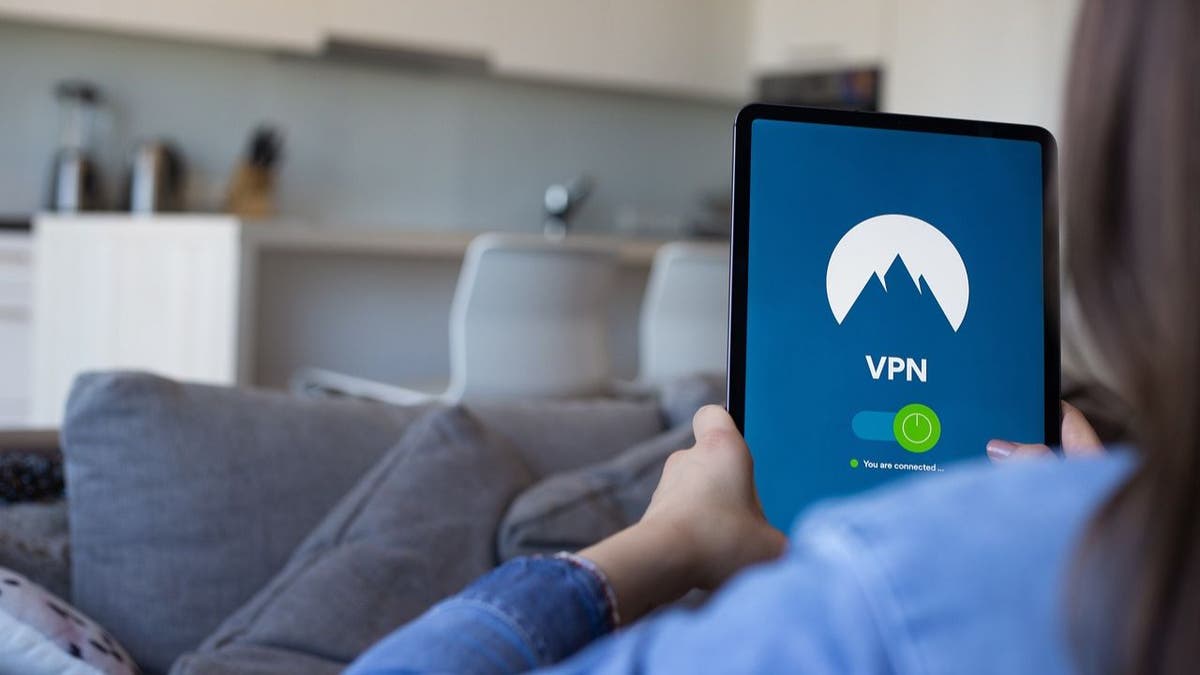Using a virtual private network (VPN) can significantly improve your online security, especially when accessing sensitive information such as banking applications. However, it can also lead to complications, such as being blocked from accessing your bank’s services.
Melissa from Dallas wrote to us asking: “How can I use a VPN without being blocked from accessing my banking app? It’s very frustrating and I worry about my security when I have to turn off the VPN. Is there any specific advice to ensure I stay safe and connected?”
Melissa, we totally understand how that can be aggravating. We’ll walk you through the steps to use VPNs effectively while ensuring your banking remains secure and accessible.
A woman logs into her VPN on her laptop (Kurt “CyberGuy” Knutsson)
What is a VPN?
A VPN encrypts your Internet traffic and redirects it through a server in a different location than yours. VPNs make it appear that you are connecting to the Internet from wherever the server is hosted rather than from your actual location.
When you first connect to a network using a VPN, your device will establish a secure connection to the VPN server and your device’s IP address will appear as the VPN server, meaning only your ISP will see it. you are connecting to a VPN Server. Typically, when you connect to a website, the website or any online service you visit may see technical information about your device, including location-sensitive data such as IP addresses.

A VPN on a laptop (Kurt “CyberGuy” Knutsson)
THE BEST VPNS FOR WEB BROWSING IN 2024
Understand VPNs and their benefits
A VPN creates a secure tunnel between your device and the Internet, encrypting your data to protect it from prying eyes. The three key benefits of using a VPN for online banking include:
1) Improved Security: It encrypts your connection, making it difficult for hackers to intercept sensitive information.
2) Privacy protection: It masks your IP address, helping you remain anonymous while browsing.
3) Access to geographically restricted content: Allows you to access banking services when traveling abroad.

Illustration of how you can use a VPN around the world (Kurt “CyberGuy” Knutsson)
HOW VPNS PROTECT YOUR IDENTITY AND SECURE YOUR FINANCIAL TRANSACTIONS AGAINST THEFT
Steps to use a VPN safely with banking apps
1) Choose the right VPN
Select a reliable VPN service that prioritizes security and privacy. Look for features like:
- Military-grade encryption (256-bit AES)
- No logs policy to ensure your activities are not tracked.
- Kill-Switch functionality to prevent data leaks if the VPN connection drops.
- Servers in your home country to avoid triggering alerts from your bank
2) Install VPN software
Download and install the VPN app on your device. Most VPN services offer easy-to-use interfaces compatible with various operating systems, including Windows, macOS, Android, and iOS.
3) Connect to a server
Before accessing your banking application:
- Launch the VPN app.
- Connect to a server located in your home country. This helps prevent your bank from flagging your access as suspicious.
4) Log in to your banking app
Once connected:
- Open your banking app or website.
- Sign in as you normally would. If you’re having trouble, consider clearing your browser cookies or changing servers within the VPN.
5) Monitor any problems
If you are having trouble signing in:
- Disable the VPN temporarily and try accessing the app again.
- Change the VPN city/location to match the city where you live or are currently located.
- When traveling, be sure to change the VPN to the city where you live to avoid problems.
- Contact customer support at both your bank and VPN provider if problems persist.

A woman logs into her VPN on her tablet (Kurt “CyberGuy” Knutsson)
CAN YOU BE TRACKED WHEN USING A VPN?
What to do when your bank blocks your VPN
Now, some websites, especially banking sites, may be a little suspicious when they see that you are using a VPN. They might even block you. So what do you do if your bank’s website won’t let you in with your VPN on? Don’t panic. Here are some quick solutions:
- Try contacting your bank’s customer service.. They may have a solution or they may be able to whitelist your VPN, which basically means allowing your connection to bypass security blocks.
- change the VPN city/location to match the city where you live or are currently located.
- If all else fails, you can always temporarily disable your VPN when accessing your banking application. Just remember to turn it back on when you’re done.
Now you may be wondering, “Is it safe to disable my VPN for banking?” Well, as long as you’re on a private, secure network (not public wifi), you should be fine. Just be sure to enable it again as soon as you’re done. Remember, while VPNs can sometimes be a bit complicated, the privacy and security they provide are worth it.
Choosing the Right VPN for Banking Security and Protection Tips
It’s important to protect your financial information with trusted VPN services and follow these handy security tips.
1) Choose a reliable VPN: Select a reliable VPN service with strong encryption protocols. For the best VPN software, check out my expert review of the best VPNs for private web browsing on your Windows, Mac, Android and iOS devices.
2) Always use VPN on public Wi-Fi: Never access financial accounts on public networks without first activating your VPN.
3) Enable two-factor authentication (2FA): Add an extra layer of security to your accounts by enabling 2FA.
4) Use strong and unique passwords: Create complex passwords for each of your accounts and consider using a password manager. Consider using a password manager to generate and store complex passwords.
5) Regularly monitor your accounts: Review your retirement accounts frequently for any suspicious activity.
6) Keep software updated: Make sure your devices and apps are always up to date with the latest security patches.
7) Beware of phishing attempts: Do not click on suspicious links or provide personal information in response to unsolicited emails. The best way to protect yourself from malicious links that install malware and potentially access your private information is to have powerful antivirus software installed on all your devices. This protection can also alert you to phishing emails and ransomware scams, keeping your personal information and digital assets safe. Get my picks for the best antivirus protection winners of 2024 for your Windows, Mac, Android, and iOS devices.
Pro Tip: Use Split Tunnels: This feature allows you to route only specific traffic through the VPN while keeping the rest of the traffic on a regular connection. It can be beneficial for banking applications while allowing general browsing without interference.
HOW TO DELETE YOUR PRIVATE INTERNET DATA
Kurt’s Key Takeaways
Using a VPN can significantly improve your online banking security by encrypting sensitive data and providing privacy protection. However, it is essential to choose a reliable service and connect properly to avoid access problems with banking applications. By following the steps and tips outlined, you can enjoy the benefits of a VPN without compromising your ability to manage your finances securely. Always be aware of potential security threats and maintain good online habits for optimal security while banking online.
Are there any misconceptions about VPNs and online banking that you would like to clear up? Let us know by writing to us at Cyberguy.com/Contact.
For more tech tips and security alerts, sign up for my free CyberGuy Report newsletter by heading to Cyberguy.com/Newsletter.
Ask Kurt a question or tell us what stories you’d like us to cover.
Follow Kurt on his social channels:
Answers to CyberGuy’s most frequently asked questions:
New from Kurt:
Copyright 2024 CyberGuy.com. All rights reserved.








